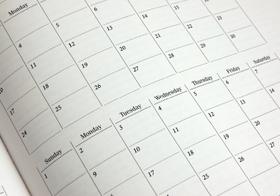Are You the Right Person for Our Job?/
In this article, I will assume the role of the school that is advertising a position.
- I want you to see and understand what goes on behind the scenes as applications come in online, via email or snail mail.
- With that knowledge, I know that you will take the extra time and care necessary to submit the kind of application that will make the first cut.
- After all, you need to make it to the interview stage.
- Otherwise, all bets are off.
- I will present the school and its thinking. I will follow that with my editorial comments and advice.
Canva generated this picture of a teacher looking at a school website.

The School: When we advertise a position, we expect to receive hundreds of applications and resumes.
- Some of these are from people whom we know; however, most of the applications are from people we do not know.
- Tell me now, why should I look at your resume?
- Here are some reasons why your application will go onto the "Review" pile.
1. You presented your application in the format that we specified.
School: Following instructions is a trait most employers value. As a result, a simple thing like following the instructions on how to apply for the job opening at our school speaks well of you. We use a standardized application form at our school in order to comply with all sorts of legal requirements. So, if you use something other than the form that we specify, your chances of making the first cut are fairly slim. While some schools will let you choose how to apply, our instructions are very specific. Please follow them to the letter.
Editor: Most schools will instruct you to apply via email.
- The following directive is typical: "Please send resume and letter of interest to hr@xxxxx.edu with “Journalism” in the subject line."
- Other schools will give you the option of sending a formal application via snail mail.
- "Candidates for all faculty positions should send a letter of interest, resume, a list of three references, and academic transcripts." This instruction means precisely what it says.
- Another school cautions applicants: "Please do not submit any documents in PDF format."
The important thing for you to remember is that each private school is unique. It does things its own way. It does not matter if the school violates some accepted norm or protocol. It is what it is. That, after all, is the essence of being a private school.
This video offers a look at Cincinnati Day School in Cincinnati, Ohio.
2. Your application offers the credentials and experience for which we are looking.
The School: If you don't have the credentials and experience that we are seeking and other candidates do have them, your chances of getting an interview will probably be slim. You would have to have an advantage, like being an alum or being known to a staff member, in order to be considered.
Editor: Here are some examples of the credentials and experiences that schools look for.
Packer Collegiate wants the journalism teacher to have the following: "A Master’s degree in English, Journalism, or Education is preferred, but not required."
Far Hills Country Day School wants a World Language Department Head who is "An experienced educator/instructor to help deliver our traditional program using progressive methods. "
If you are fortunate enough to know somebody who works at the school, ask him or her to be one of your references.
3. You state your objective clearly and cogently.
School: "I love teaching. I especially like teaching young people."
- We want to hear applicants say that. Clearly. Unequivocally.
- Somewhere, somehow, you need to get that point across.
- That's what private schools look for.
- It's what our parents demand.
- Since our parents are paying substantial amounts of money to educate their children at our school, we listen very carefully to what our parents ask for.
- Combine that love of teaching and passion for your subject with solid experience and superb credentials and you will advance to the front of the line.
Editor: From the skills and competencies required for a position at Buckingham Browne & Nichols School: "The candidate will demonstrate the following: Enjoys working with high school-aged students. Excellent writing skills. Warmth, sense of humor, and tact."
And Maret School's requirements for a Spanish teacher: "Strong candidates will be enthusiastic about teaching both middle and upper school students."
4. You have strong references.
School: We require three references.
These should be previous employers wherever possible.
Yes, we will ask them why you left and under what terms.
It matters to us that you left your previous position because your contract was not renewed.
So, we will ask why that occurred. If your spouse was transferred and you had to move to a new city, we will need to know that.
Consequently, make sure that your references are enthusiastic supporters of you and your teaching career.
This video offers a look at Buckingham Browne & Nichols School in Cambridge, Massachusetts.
Editor: What do you do if you are starting?
- References from your professors and trusted community leaders will help.
- You need advocates. Find the best ones you can.
- Explain to them what you are hoping to accomplish. Show your appreciation for their help and assistance.
5. You can coach a sport or supervise an extracurricular activity.
School: Athletics and extracurricular activities are an integral part of our program.
- We expect our teachers to coach a sport or supervise an extracurricular activity.
- We educate the whole child. We need our faculty and staff to embrace that philosophy wholeheartedly.
Editor: You should include a list of activities and interests in your resume.
- Schools will read that section of your resume with interest, especially if it is a match for their requirements.
- If you have won prizes or been recognized by your peers, including those awards as well.
- Entries such as "State Squash Champion, Ardley High School Squash Team, 2005" or "Attended Cannes Film Festival 2011" denote a level of achievement and interest that might set your application apart from the competition.
Conclusion
Success in landing a private school teaching position requires more than just strong credentials. Iit demands attention to detail, clear communication of your passion for teaching, and a willingness to contribute to the whole school community. By carefully following application instructions, highlighting relevant experience, and demonstrating your commitment to educating the whole child, you'll significantly improve your chances of making it to the interview stage. Remember, private schools seek not just teachers but dedicated professionals who will become integral members of their educational community.
As you probably have realized, applying to any private school for employment demands that you be completely tuned into that particular school's requirements. Spend time reviewing each school's website in order to understand its educational philosophy and perspective. That will help you craft an application package that, at the very least, will get your application noticed.
Questions? Contact us on Facebook, Instagram, and YouTube. @privateschoolreview
#PrivateSchools #PrivateSchoolsNearMe #TeachingJobs #EducationCareers #TeacherHiring #SchoolEmployment






















